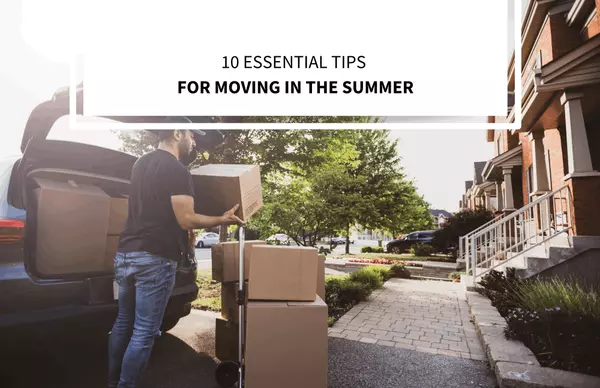
11 Tips to Beat the Back-to-School Rush When Buying or Selling in August
As the final days of summer vacation dwindle, August becomes a prime time for families to make significant moves before the new school year begins. Whether buying or selling, this month presents a unique set of opportunities and challenges. Here’s how to navigate the real estate market and relocate smoothly before the school bell rings. 1. Buying in August: Timing and Strategy Leverage Market Trends - August can be a favorable time for buyers as the real estate market often slows down slightly. Many families aim to settle before school starts, so by mid-August, there might be fewer competing buyers, potentially giving you more negotiating power. Focus on School Districts - When buying in August, prioritize homes in desirable school districts. Good schools often drive up property values and ensure a stable investment. Use online resources and school rating websites to research and compare districts. Expedite Your Mortgage Process - With a tight timeline, ensure your finances are in order. Get pre-approved for a mortgage to speed up the buying process. Work closely with your lender to avoid any delays, and consider a fast-tracked closing if possible. 2. Selling in August: Stand Out in the Market Highlight School Proximity - When listing your home, emphasize its proximity to good schools. Include details about walking distances, bus routes, and nearby parks or recreational facilities that appeal to families. Stage for Family Appeal - Stage your home with families in mind. Set up spaces that showcase functional living areas, such as a homework station or a cozy reading nook. Highlight outdoor spaces as well, suggesting their potential for family gatherings. Price Competitively - Price your home competitively to attract serious buyers looking to move before school starts. Research recent sales in your area and consider a professional appraisal to set a realistic and appealing price point. 3. Moving in August: Schedule Early - August is a busy month for moving companies, so book your movers as early as possible. Confirm all details a week before the move to ensure everything is on track. Declutter and Organize - Take the opportunity to declutter before packing. Donate or sell items you no longer need, and organize belongings to make unpacking easier. Label boxes clearly, especially those containing school supplies and essential items for the first few days in your new home. Prepare for a Smooth Transition - Help your children adjust to the move by involving them in the process. Visit the new neighborhood, explore local parks, and if possible, tour the new school. Familiarity can ease anxiety and make the transition smoother. Use a Moving Checklist - A comprehensive moving checklist can keep you organized and ensure you don’t miss any crucial steps. Include tasks such as changing your address, transferring utilities, and updating school records. Communicate with Schools - Inform your children’s current and new schools about the move. Ensure all necessary paperwork, such as transcripts and health records, are transferred in time for the new school year. Plan for the First Week - Pack a first-week essentials box with items like toiletries, a few days’ worth of clothes, basic kitchen supplies, and important documents. This will make the initial days in your new home less stressful.

6 Ways to Prepare Your Home for Summer Storms
As summer continues, so does the potential for severe weather, including thunderstorms, hurricanes, and heavy rainfall. Safeguard your home and family against the effects of summer storms with these 6 essential tips to prepare your home. Trim Trees and Shrubs: Overhanging branches can pose a significant risk during storms, potentially causing damage to your home or vehicles. Trim trees and shrubs near your house to minimize the risk of falling branches. Hire a professional to trim ones near power lines. Clean Gutters and Downspouts: Clear debris from gutters and downspouts to ensure proper drainage during heavy rainfall. Clogged gutters can lead to water backup and potential flooding in your home. Inspect Roof and Windows: Inspect your roof for any signs of damage or loose shingles that could become dislodged during high winds. Check windows for cracks or gaps and seal any areas where water could penetrate. Secure Outdoor Furniture and Decor: Secure outdoor furniture, grills, and decor items to prevent them from becoming projectiles in strong winds. Store lightweight items indoors or anchor them securely to the ground. Install Storm Shutters or Panels: Consider installing storm shutters or panels to protect windows and doors from flying debris and high winds. Alternatively, you can reinforce windows with plywood for temporary protection during storms. Check Sump Pump and Basement: Ensure your sump pump is in good working condition and test it regularly to prevent basement flooding during heavy rains. Consider installing a backup battery or generator in case of power outages.

10 Essential Tips for Moving in the Summer
Summer is a popular time for moving, but it can also be one of the most challenging seasons due to the heat and busy schedules. By following these tips, you can make your summer move a breeze and start settling into your new home with ease. Visit your new home a day before move-in day to turn the air conditioning to a comfortable temperature, stock the refrigerator with water bottles, and stock the bathroom(s) with toilet paper and hand soap. Schedule your move during the cooler parts of the day, such as early morning or late afternoon, to avoid the scorching midday sun. Keep yourself and your moving crew hydrated by providing plenty of water and electrolyte drinks throughout the day. Wrap fragile items in bubble wrap or packing paper and label boxes clearly to ensure they're handled with care. Pack heavier items in smaller boxes to prevent them from becoming too heavy to lift. Use blankets or towels to protect furniture from scratches and damage. Take the opportunity to declutter and donate items you no longer need or use. This will lighten your load and make unpacking easier. Consider hiring professional movers to help with the heavy lifting and transportation. They have the experience and equipment to make your move more efficient. Notify your utility companies of your move and schedule disconnection and reconnection dates for services, like electricity, water, and internet. Pack a separate box with essentials like toiletries, medications, snacks, and important documents you'll need on moving day. Moving can be physically and mentally exhausting, so take breaks often to rest and recharge.
Categories
Recent Posts









